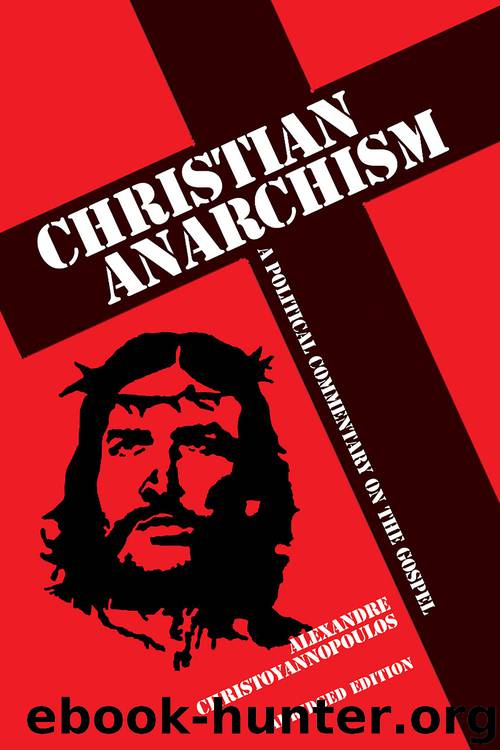Christian Anarchism by Christoyannopoulos Alexandre

Author:Christoyannopoulos, Alexandre
Language: eng
Format: epub
Tags: Christian anarchism, secularism, Tolstoy, Ellul, Eller, Catholic Worker movement, the Church, economy, New Testment, politics, non-violence, politicak obligation, resistance, compassion, justice, radical Christianity, anarchism, theology, political theology, anarcho-capitalists, Sermon on the Mount, Jesus, violence, Old Testament, civil disobedience, revolution, God
ISBN: 9781845406622
Publisher: Andrews UK
Published: 2013-08-20T16:00:00+00:00
3.4.3 - Institutional religion
Christian anarchists maintain that Jesus did not intend to be the founder of an institutionalised religion. One of Jesus’ intentions, for them, was indeed to bypass such human intermediaries and do away with priests. In line with this, the early church was more of a popular movement than an institution - Elliott and Andrews call it the “Jesus Movement.”[235] Tolstoy argues that this early church “existed in her purity as long as her teachers endured patiently and suffered,” but that this ended “as soon as they became fat and sleek.”[236] For Christian anarchists, today’s institutionalised “church” bears little resemblance to its oldest ancestor, and must be clearly dissociated from the church or assembly which Jesus initially intended.
Given this assessment on the corruption of the church, several Christian anarchists (with significant exceptions)[237] are very critical of institutionalised or organised religion. Hennacy writes that “All religions are a mockery of God no matter if they were once started by inspired prophets.”[238] He frequently and pointedly describes himself as a “nonchurch Christian.”[239] He insists that when an organisation becomes more important than its alleged ideal, it becomes institutionalised and thus corrupt. In turn, institutionalised religion typically seeks support and protection from the state. Over time, the corrupt and powerful organisation becomes tyrannical and dictatorial. For Tolstoy, as Jesus says, a tree must be judged by its fruits, and since organised religion and its priesthood produces evil fruits, it must be rejected.
Christian anarchists therefore sometimes use strong language against the church and its clergy. The priests, for Tolstoy, “are not only not the pillars of Christianity they profess to be, but are its greatest enemies.”[240] The church is a “church of Satan,” says one contributor to A Pinch of Salt.[241] Chelčický calls the pope the Antichrist, and a contemporary Church Council “an assembly of harlots, assassins of righteous men, and transgressors of all commandments of God.”[242] Hennacy, however, concedes that he does not think that churchmen “are knowingly wicked people,” but simply that “they are in a bad business.”[243]
Not all Christian anarchists use strong language to describe the church and clergy (again, Catholic Workers like Day spring to mind as exceptions), but the majority are very critical of the institutional church and its historical achievements. Either way, implicitly or explicitly, all Christian anarchists call for a frank re-examination of Jesus’ teaching and life. All see revolutionary potential in it. All see criticism of the state implicit in it. All see an anarchist society envisioned in it. Few believe the institutional church to be founded in it, and most are very critical of what the church made of it. For them, for true Christianity to be embraced by humanity, Jesus’ teaching and example must be examined anew.
Download
This site does not store any files on its server. We only index and link to content provided by other sites. Please contact the content providers to delete copyright contents if any and email us, we'll remove relevant links or contents immediately.
| Anarchism | Communism & Socialism |
| Conservatism & Liberalism | Democracy |
| Fascism | Libertarianism |
| Nationalism | Radicalism |
| Utopian |
The Secret History by Donna Tartt(19032)
The Social Justice Warrior Handbook by Lisa De Pasquale(12182)
Thirteen Reasons Why by Jay Asher(8883)
This Is How You Lose Her by Junot Diaz(6872)
Weapons of Math Destruction by Cathy O'Neil(6261)
Zero to One by Peter Thiel(5782)
Beartown by Fredrik Backman(5734)
The Myth of the Strong Leader by Archie Brown(5491)
The Fire Next Time by James Baldwin(5424)
How Democracies Die by Steven Levitsky & Daniel Ziblatt(5211)
Promise Me, Dad by Joe Biden(5139)
Stone's Rules by Roger Stone(5079)
A Higher Loyalty: Truth, Lies, and Leadership by James Comey(4946)
100 Deadly Skills by Clint Emerson(4911)
Rise and Kill First by Ronen Bergman(4775)
Secrecy World by Jake Bernstein(4738)
The David Icke Guide to the Global Conspiracy (and how to end it) by David Icke(4696)
The Farm by Tom Rob Smith(4500)
The Doomsday Machine by Daniel Ellsberg(4481)
